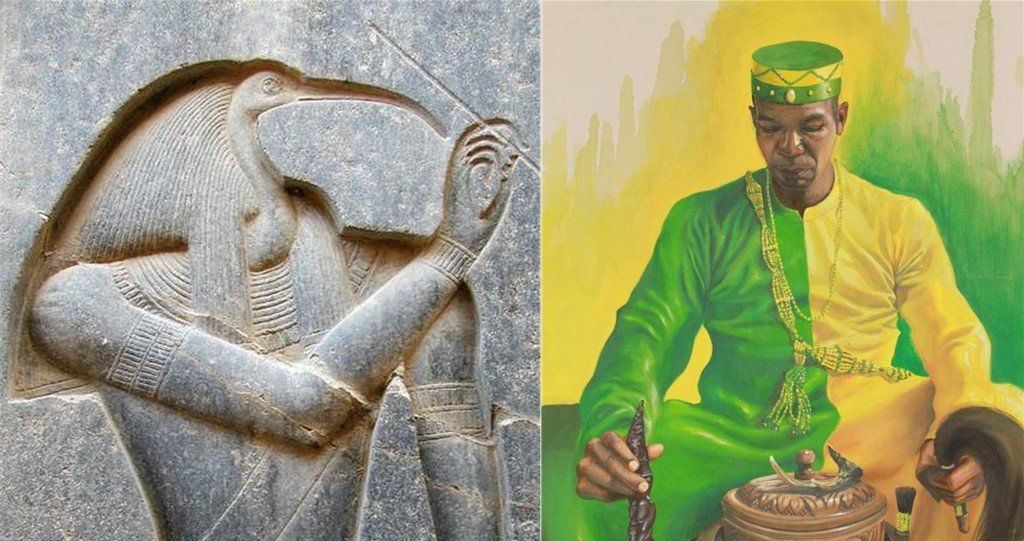Afrikan History is Not Hinged on Fleeting Trends of Popularity – This is Not Happenstance
- By kwende ukaidi
- •
- 21 Oct, 2021
- •
Celebrating the Afrikan History Continuum

The superlative wisdom deities
such as Djehuti, Orunmila and Anansi empower the Afrikan history continuum in
deep and profound ways. That which they empower they are also a firm part of, just as
it is with Afrikan souls throughout the world.
Naturally, Afrikan history is as popular as whatever number of Afrikan souls there are presently in the world. However, for the Afrikan the level of popularity history holds also naturally includes the vast countless multitudes that have expressed self-determined effort to bring it into being throughout the ages before now. Further, the popularity of Afrikan history naturally also hold the immeasurable number of Afrikan souls yet to come that will etch upon the world their self-determined thrust. Popularity from the Afrikan worldview is not restricted to any given lifespan, generation or age. It is as large as the number that have asserted their experience then, now and throughout the tomorrows to come. Afrikan history is not a separate entity to Afrikan life, it is an identifier of life’s continual self-determined expression.
In honing in on the definition of the word popular, according to a mainstream platform the word refers to:
“the state or condition of being liked, admired, or supported by many people”
If applied to Afrikan history the following could be asked of Afrikan people. Do Afrikan people like themselves? Do Afrikan people admire themselves? Do Afrikan people support themselves? Such questions would surely be redundant even nonsensical in the course of natural Afrikan living, for the affirmatives are inherent in the Afrikan way. However, in the context of interruption and disruption as in the Maafa of recent centuries, Afrikan souls have the imperative mission to restore themselves to fully return to a state of affirmative answers as the meaningful and general norm.
Afrikan pride, dignity and the highest standards of living and excellence would be the living testament in affirmation. Familyhood and nationhood would be an obvious reflection of the positive answers to these and other questions that can arise from unnatural disruptive conditions.
The popularity of Afrikan history confined as a measure to any period of disruption can surely only be an indicator of the effort required by Afrikan souls to re-attain optimal functionality throughout all the levels of self for flourishing continual history to unfold.
If the vulnerable, coerced outside of self or otherwise unknowing Afrikan says, ‘Don’t bother with that Afrikan history stuff!’, is this soul actually saying, ‘I don’t like self’, ‘I have no admiration for self’ or ‘I don’t care to support self’ ? Rightful functioning, missioning and order are not always ‘popular’ in any crass, isolated and immediate sense. However, the thrust of the Afrikan continuum never ceases to be as Afrikan souls of the world in ever greater numbers restore themselves to fullest ascension.
Afrikan history has always been and continues to be living history. It lives as its people have lived, live and continue to live. Afrikan history is not hinged on fleeting trends of popularity – this is not happenstance.
Afrikan Historia Msimu is an observance period for the duration of the tenth
month of the year (so-called October). This is a special time for learning,
growth and development of the Afrikan experience in the world. It is a time of
spiritual and cultural elevation as Afrikan history is restored to fabric of
life in the living knowingness of the then, the now and tomorrow. Great ones of
the Afrikan journey are highlighted and the symbols relevant to the time
invigorate life in the imperative onward flow of global Afrikan ascendancy.
This wonderful observance is a part of the cultural calendar of the Universal
Royal Afrikan Nation (URAN).
The Universal Royal Afrikan Nation (URAN) is an Afrikan-centred spiritual and cultural mission for ascendancy that embodies living spiritually and culturally rooted life. To find out more about URAN and its spiritual-cultural mission for liberty and nationhood click here. The exquisite URAN pendant can be obtained online by clicking here.
In his capacity as an Afrikan-centred spiritual cultural practitioner this author is available for further learning in this regard and also for the carrying out of ceremonies such as naming and name reclamation. For details please click here.
Afrikan World Studies programmes are important forms of study in understanding the Afrikan experience. There are a range of subjects covered on these programmes including History, Creative Production, Psychology and Religion. To find out more about these learning programmes please click here. For the video promo for these learning programmes click here.
At nominal cost, also consider acquisition of an a4 laminate poster of articulations by this author when visiting the Yemanja institution to enrol, consult, learn, gather or otherwise.
Also, visit www.u-ran.org for links to Afrikan liberation Love radio programme on Universal Royal Afrikan Radio online.
